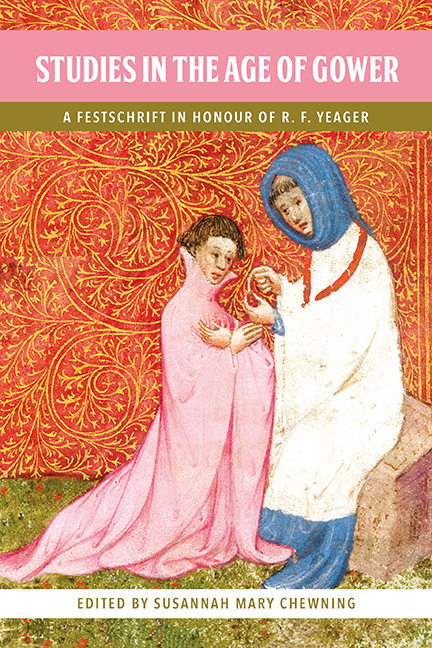Book contents
- Frontmatter
- Contents
- List of Illustrations
- Notes on Contributors
- Acknowledgements
- List of Abbreviations
- Introduction
- Part I Text
- Part II Gender
- Part III Time
- Part IV Spirit
- Part V Intersections
- A Personal Tribute to R.F. Yeager
- Bibliography of R.F. Yeager’s Writings
- General Bibliography
- Index
- Miscellaneous Endmatter
1 - Edward Thomas on Gower
Published online by Cambridge University Press: 28 April 2020
- Frontmatter
- Contents
- List of Illustrations
- Notes on Contributors
- Acknowledgements
- List of Abbreviations
- Introduction
- Part I Text
- Part II Gender
- Part III Time
- Part IV Spirit
- Part V Intersections
- A Personal Tribute to R.F. Yeager
- Bibliography of R.F. Yeager’s Writings
- General Bibliography
- Index
- Miscellaneous Endmatter
Summary
G.C. MACAULAY 's GREAT EDITION of The Complete Works of John Gower, published by the Clarendon Press in four volumes between 1899 and 1902, did not excite much comment when it appeared. It received very few contemporary reviews, either of individual volumes or of the complete work. There is, therefore, some value in reprinting two reviews that, to the best of my knowledge, have never been recorded in the history of Gower's reception.
One particularly interesting aspect of these reviews is their authorship. When Edward Thomas (1878–1917) came down from Oxford in 1900 he already had a wife and child to support. In desperate need of money he was forced into a life dominated by literary hackwork of various kinds to sustain his family, and was often in a state of penury. In November 1900 he succeeded Lionel Johnson as the main reviewer for the London Daily Chronicle. By April 1914, when he wrote his last review for the paper, nearly seven hundred had appeared in its pages from his pen. During that period he also wrote many reviews and articles for other journals as well as various books. The constant pressure to earn sufficient money restricted his ability to write the poetry on which his posthumous reputation largely depends.
The extent of the works he reviewed was as remarkable as their number. Although many dealt with modern literature in both verse and prose, English and foreign, he also wrote on a wider range of topics that reveal his critical sympathy for literature of different periods. An indication of that range of interest can be found in his two reviews, early in his career at the Chronicle, of parts of Macaulay's edition of Gower. He reviewed volumes II and III (Confessio Amantis, published in 1901) on 18 June 1901, and volume IV (Latin Works, published in 1902) on 29 October 1902. As with all his reviews for the Chronicle these were unsigned.
In his first review, “Chaucer's Mate,” Thomas sets Gower's Confessio in direct comparison to Chaucer. Such a comparison initially works predictably to Gower's disadvantage. Gower is placed as his inferior hierarchically and aesthetically: “Chaucer is a scholar; Gower smacks of the school, and is to his contemporary as Cowley is to Milton.” When Thomas moves beyond such categorizing judgements to a consideration of Gower's intrinsic qualities, his tone is consistently appreciative.
- Type
- Chapter
- Information
- Studies in the Age of GowerA Festschrift in Honour of Robert F. Yeager, pp. 11 - 20Publisher: Boydell & BrewerPrint publication year: 2020



